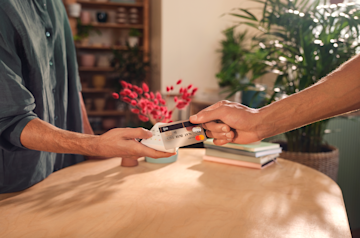
Healthy New Year? How to change your eating habits (and stick to them)
We don’t believe in diets — so here’s our alternative tips on how to stay healthy and happy in the new year.
9 min read
Dry January and Veganuary are a good start. But what happens in February, or June? Will you have canned beer and frozen pizza as often as you did last year? Let’s be honest: probably. If your New Year’s resolution is to get healthier, self-denial won’t do the trick. It’s more sustainable to develop new habits gradually — and be kind to yourself. For what it’s worth, we’re skipping the stress of New Year’s resolutions. If you enjoy a glass of wine with your food or can’t live without cheese, that’s fine! Day-to-day life is tough enough as it is. But that’s not to say that you can’t kick start some good habits that will see you in good stead all year long. Keep reading and learn how to start the new year off fresh and live healthier in the long run.From books and podcasts to videos on YouTube, there are countless guides to self-care and how to design a healthy lifestyle. What almost all of them have in common is that they target habits and routines. Habits are behaviors or actions you can perform in your sleep — you’ve repeated them so many times that they have become deeply embedded in your brain. And you can think of routines like a string of habits, all linked together. Routines provide structure, save energy, and facilitate decision-making processes.Most self-help guides use the same concept as a starting point: Every small routine is learned behavior. That’s why you also can unlearn bad habits and develop new, healthy habits. There’s a whole body of research showing that it takes about two months until new processes sink in deep into memory. But once they become a part of you, you won’t get rid of them easily. So, how can you form healthy habits and stick to them? The first step is to envision what you gain from your new habit. This actually motivates you more than thinking about what you “lose.” Give up smoking? Sounds like a loss. More stamina during sports (and sex)? Sounds like a win! Once you found what intrinsically motivates you, use the following tips:Eating habits are basically the same as other habits. We often run on autopilot, especially when we’re hungry or stressed. Instead of taking a moment to think about where to get healthy food, perhaps you quickly buy a chocolate croissant as soon as your stomach growls. Or, you have lunch everyday at 1 p.m. — whether you’re hungry or not. Food is also often connected with company. It’s harder to eat less when you have breakfast with your partner or lunch with your colleagues. You’re engaged in (or bored of) the conversation and almost subconsciously reach for that last piece of bread. Emotions are another factor: To some, chocolate is the best medicine to heal a broken heart, while others can barely eat when they’re feeling depressed. And, last but not least, many of us often lack the time. As a full-time working mom, you might only take five minutes for lunch, and check your messages while gulping down a mouthful or two.However, once you become aware of the underlying reasons for your behavior and know that eating is a habit — and habits can change — you can take the wheel and change course! Whatever your goal, here are four ideas for how to form healthy eating habits.Whether it’s pizza, fries, or hot dogs, we know fast food can be irresistible — especially after a long night out. However, how about “saving” burgers and co. for special occasions? It’s not a big deal to have fast food every once in a while. But if your normal diet revolves around it, you can harm your body in the long term. Not to mention, having the same type of food everyday can get pretty boring, too.So, how can you overcome the urge to get that greasy slice of pizza at the train station? Try keeping a bag of nuts in your bag for emergency cravings, or take a few minutes at home to pack a sandwich for later. Another way is to avoid routes that lead by your favorite kebab shop or drive-in. And who knows? On the new route, you might discover a cute little café that sells salad bowls to take away, or an organic bakery, or the love of your life…Dry January is a popular idea because December usually is a boozy month: mulled wine at the Christmas market, G&Ts at company events, and sparkling wine on New Year’s Eve. No wonder our heads are still spinning in January. However, after a month-long hiatus from hooch, it’s hard to stay motivated — the novelty of drinking again can escalate pretty quickly.Instead, ask yourself what you can do differently in general. Do you love having a beer when watching Netflix, for example? Swap your stock of pilsners for alcohol-free beers. Maybe it’s not even the beer itself but just something to sip — you can try drinking tea or juice. Or, you could go on an evening walk, put your headphones on (or in), and combine two new habits: less alcohol and more exercise.Not eating out is hard when you live in a city with countless restaurants. This is also reflected in your Monthly Wrap-Ups, as costs tend to accumulate. New Year’s is the perfect starting point to change that! When you cook at home more often, you eat healthier as well as save money and time. Going shopping and cooking obviously takes time and effort, but you can cook in batches, i.e. prepare several meals and put them in the freezer. That way you can do all the shopping in one go rather than buying items here and there (and potentially overspend). Then, defrost bread or soup when you need it. For more tips, read our guide to saving money on groceries.Whether it’s butter, cheese, or meat, many of the products on our grocery store shelves are currently more expensive due to inflation. However, there are even more reasons to buy plant-based products, such as animal welfare, climate protection, and your own health. Eggs and salami aren’t unhealthy, per se. But eating too many animal products can have long-term effects, such as a higher risk for inflammation, stroke, or kidney stones — just like excessive amounts of sugar increase your long-term risk of type-2-diabetes.Vegetables, on the other hand, are full of healthy fibers, vitamins, and minerals, and they’re low in calories. Best of all: There’s a ton of variety. How about roasting potatoes, zucchini, and peppers in the oven? Or frying some kohlrabi and seasoning it with tahini sauce? This way you not only reduce your meat and cheese consumption, you also avoid overspending on vegan schnitzel and other meat-replacement products (which are often highly processed and sometimes even contain pollutants).
Did all this reading make you crave roasted veggies or homemade vegetarian lasagna? Just flink it! Flink delivers your groceries in minutes all the way to your doorstep — so you can save time and stress, and conveniently do your shopping from the train or snuggled up on the couch. And with Mastercard x Flink x N26, you get up to €30 credit on your first three orders when paying with your N26 Mastercard. That’s a yummy €10 x 3 credit on all the things that keep you happy and satisfied. Simply go to the Explore tab in your N26 app, choose Flink under Perks, and follow the instructions. The offer is valid from January 15 – March 31, 2024. Don’t have an account with N26 yet? With our bank accounts, you get more than just exclusive perks. You unlock handy budgeting tools to easily change your financial habits, too! Set flexible spending and withdrawal limits so you can always stick to your budget, and use Insights to stay on top of your finances. The feature automatically breaks down your spending in categories and compares it to your income, so you know exactly where your money goes every month. Want to save a little? Create up to 10 Spaces sub-accounts for your savings goals and use Rules to automate your deposits, easy as 1-2-3. And if you want to grow your savings, open an Instant Savings Account and earn up to 2.6% interest p.a. — no matter which plan you choose.
How new habits help you have a glow-up
How to establish new habits
- Set clearly defined goals. “Adopt a healthier lifestyle” is a good idea, but it’s also pretty vague. Try to be more concrete, such as: “Walk one subway station on the way to work,” or “Cook at home three times a week”.
- Be realistic. If your initial goals are too high, you’ll likely fall short. Start small and gradually make your way to the top.
- Plan ahead. Book a boxing class and pay upfront to make sure you’re really going. Or prepare a meal for the next day, so you won’t order in again between two busy meetings.
- Use daily reminders. Add plans to your smartphone calendar, put sticky notes on the mirror, or create to-do-lists as a way to remind yourself of your goals.
- Move obstacles out of the way. People often abandon their New Year’s resolutions because they aren’t compatible with the realities of daily life. Before you set lofty goals, think about what your usual stumbling blocks are. Then, you can take some necessary precautions first.
- Get your buddies on board. Whether it’s with a friend, your partner, or a group, developing new habits together is much more fun and a great source of motivation.
- Link new with old habits. This is one of the most effective tricks! Do you drive to work every day but never find the time to have breakfast first? Make it a habit to drink a (homemade) smoothie on your commute.
- Be good to yourself. Give yourself a pat on the back for every little milestone you reach, and reflect on the reasons for a setback rather than punishing yourself. If this is a hard thing for you to do, imagine what a personal coach or trainer might say — or your best friend who’s never short on encouragement.
Eating habits and why it’s so hard to change them
Eating habits you can change (if you want to)
Skip fast foods for a more balanced diet
How to change drinking habits
Cook at home to save money
Veggies: your secret weapon
Start new habits with N26
Find similar stories
BY N26Love your bank
Related Post
These might also interest youLIFESTYLECould AI help you manage your money?86% of people are open to using AI for financial planning, but is it safe? Learn how AI is already transforming money management, and discover the pros and cons.
4 min read
LIFESTYLEUnderstanding tariffsFrom higher grocery bills, pricier electronics, and stock market swings, tariffs can impact your wallet and your investments.
5 min read
LIFESTYLEDe-hyping the no-spend challengeThis extreme challenge promises to transform your finances, but is it really the game-changer it claims to be?
4 min read


